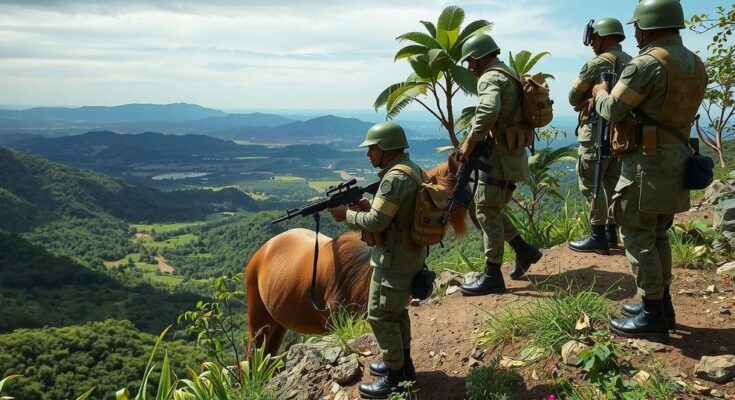Guatemalan and Salvadoran troops recently arrived in Haiti as part of a U.N. initiative to address ‘gang violence’ despite widespread criticism of foreign interventions. The narrative that external forces can restore order overshadows the real needs of the Haitian people, who continue to face economic and environmental crises. Resistance against foreign occupation and calls for authentic self-determination resonate among the populace, emphasizing the necessity for justice and sovereignty.
Guatemalan and Salvadoran troops have recently commenced operations in Haiti, following a United Nations Security Council meeting that emphasized expanding international military presence, notably under the influence of the United States and the UN. Miroslav Jenča, Assistant Secretary-General for Europe, Central Asia, and the Americas, and other officials perpetuated the narrative of ‘gang violence’ in Haiti, which they attribute to the state’s declining authority. This portrayal diverts attention from the reality that the emergence of armed groups can be traced back to historical and systemic failures of foreign policies imposed on Haiti.
On January 3, authorities in Haiti heralded the arrival of 75 Guatemalan and eight Salvadoran officers, aligned with the Multinational Security Support (MSS) Mission. This reception was marked by a display of solidarity between their governments and the existing Haitian leadership, which lacks democratic legitimacy. Their presence is portrayed as a partnership aimed at restoring order, yet it stands in stark contrast to the true needs of the Haitian populace, who have historically opposed foreign interventions.
The economic situation in Haiti remains dire, exemplified by soaring prices for essential goods amid stagnant wages for laborers. Reports reveal that basic commodities have become increasingly unaffordable, while labor costs hover at approximately $4.14 per month for most workers. The influx of foreign troops serves to reinforce a narrative that external forces can offer solutions where local governance has failed, thus undermining any grassroots efforts for autonomy.
Environmental crises compound the struggles faced by Haitians, striking the nation with severe flooding and mudslides that have dislocated thousands of individuals. These conditions have precipitated calls for urgent governmental action, which have largely gone unanswered by the U.S.-backed transitional government in power. Furthermore, deportations of Haitian workers from the Dominican Republic exacerbate the humanitarian crisis, compelling many to seek refuge in a deteriorating situation.
Despite these challenges, the Haitian spirit of resistance endures, with local activists fervently advocating against both occupiers and neocolonialist practices that have historically inflicted suffering. There exists a notable demand for authentic democracy, the removal of imposed authority, and the pursuit of self-determination. Reflections from legendary leaders like Jean-Jacques Dessalines resonate deeply within these actions, echoing the heart of Haiti’s revolutionary ethos. The call for global solidarity against the ongoing occupation emerges strongly as an imperative for justice and respect for Haiti’s sovereignty.
The geopolitical context surrounding Haiti is characterized by a long history of colonialism and foreign interventions, particularly from Western powers aiming to exert influence over the region. Since gaining independence in 1804, Haiti has faced numerous challenges, including economic exploitation and institutional decay, exacerbated by external impositions and policies that have systematically undermined its sovereignty. In recent times, the portrayal of ‘gang violence’ and the justification of foreign military presence serve to obscure the underlying causes of instability, primarily rooted in dependency and neocolonial practices. The latest arrival of Guatemalan and Salvadoran troops under the auspices of a United Nations-led initiative reflects a continuation of this troubling legacy, further complicating the quest for true autonomy and stability in Haiti.
In conclusion, the recent troop deployments from Guatemala and El Salvador to Haiti underscore an ongoing cycle of foreign intervention that perpetuates instability rather than addressing the root causes of Haiti’s challenges. The economic and environmental crises gripping the nation highlight the adverse impacts of such occupations and raise critical questions about the effectiveness of external solutions. As Haitians continue to assert their demands for genuine self-governance and dignity, the call for an end to imperialistic practices remains paramount. Actualizing a path toward self-determination and restoring the sovereignty of the Haitian people represents not only a national necessity but also a moral imperative for the international community.
Original Source: www.liberationnews.org




